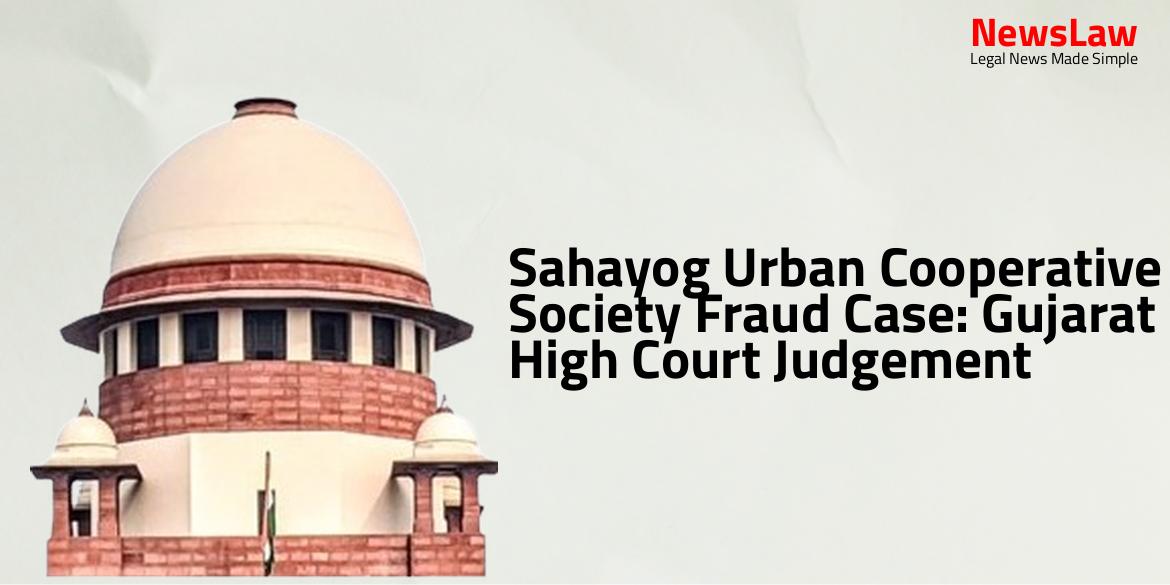The Sahayog Urban Cooperative Society fraud case has reached a decisive point with the recent judgement of the Gujarat High Court. The court has carefully examined the allegations of fraudulent activities involving 23 individuals, including Managing Body members, resulting in a significant loss for the Society. The court’s decision holds paramount importance in upholding the principles of justice and accountability within cooperative societies. Let’s delve into the details of the judgement and its implications for the involved parties and the cooperative society at large.
Facts
- Sahayog Urban Cooperative Credit and Consumer Society Limited is a registered cooperative society under the Gujarat Cooperative Societies Act, 1961.
- The society has been classified as Class-B in the audit report by Mr. H.V. Danecha, the Circle Auditor.
- The balance-sheet of the society was examined along with the audit report.
- No specific allegations have been made against individuals named in the auditor’s special report for defalcating funds.
- The society operates in Surat city and is located at 405, 4th Floor, ABC/w, Sudama Chowk, Mota Varachha, Surat.
- Allegations suggest that the society takes deposits at a high interest rate which results in losses when giving loans to members.
- Audits have been conducted for the periods from January 25, 2019 to March, 2018 and from April 01, 2019 to March 31, 2023.
Arguments
- The petitioner argues that the FIR is politically motivated and he has not gained financially from the Society.
- He claims that paying higher interest to known depositors was a decision taken by the Board of Directors and does not constitute fraud.
- The petitioner asserts that he did not individually commit the offense of paying higher interest.
- Allegations in the FIR regarding wrongful expenses and causing losses are deemed baseless by the petitioner.
- It is mentioned that the majority of the alleged loss occurred during the time the complainant was the President of the Society.
- The petitioner suggests that only a loss to the Society is alleged, not fraud.
- He states that he has strong roots in the community, is cooperative with the investigation, and has no criminal record.
- The opposing counsel argues that there is a prima facie case against the petitioner for embezzlement and fabrication of documents.
- The opposing counsel contends that the petitioner may have defrauded the Society by paying excess interest to depositors.
- The audit reports presented do not indicate any wrongdoing by the petitioner, implying a potential personal vendetta by the complainant.
- FIR filed pursuant to audit report by the Registrar, Cooperative Societies may be considered as misfeasance, not criminal act.
- FIR filed pursuant to direction under section 93 of the Act implying unintentional action by the petitioner.
- Some accused granted bail as they were ready to deposit more than the alleged amount against them, not aiding petitioner’s case.
- Complainant’s counsel and the APP argue for dismissal citing significant fraud amount and active role of petitioner in the offense.
- Custodial interrogation requested for specific allegations against the petitioner.
Analysis
- The allegations suggest that 23 individuals, including the Managing Body members, have engaged in fraudulent activities leading to a loss of Rs.54,22,620/- for the Society.
- The economic offense was meticulously planned and executed, indicating a deliberate intention to defraud the Society.
- Granting anticipatory bail is a discretionary power of the court and should only be considered in exceptional circumstances.
- The court’s discretion in granting anticipatory bail should consider the gravity of the accusation, risk of the applicant absconding, and other relevant factors.
- The accused individuals have significantly weakened the financial stability of the Society through their actions.
- Previous cases where anticipatory bail was granted were exceptional and based on the accused voluntarily depositing amounts exceeding the alleged fraud.
- Anticipatory bail is not a right but an extraordinary remedy, particularly in cases of economic offenses.
- The foundation of a Cooperative Society is based on principles of self-help and mutual support, emphasizing voluntary participation without external influence.
- The power under Section 438 of the Code of Criminal Procedure is an extraordinary power and should be exercised sparingly in appropriate and fit cases.
- Pre-arrest bail aims to strike a balance between an individual’s right to personal freedom and the investigating agency’s right to collect relevant information necessary for the case.
- Grant of anticipatory bail may hinder the investigation process by preventing the interrogation of the accused and collection of crucial information and materials.
- The court must carefully consider the nature and gravity of the accusation, the possibility of the applicant fleeing from justice, and other factors before deciding on granting anticipatory bail.
- The legislative intent behind Section 438 CrPC is to protect an individual’s personal liberty and shield them from potential humiliation and unnecessary police custody.
- Anticipatory bail should be granted only in exceptional cases to ensure a balance between personal liberty and societal interests.
- The court should exercise caution while granting anticipatory bail as it could impede effective investigation, especially in cases of economic offenses.
- The Court has decided not to grant anticipatory bail in this case.
- Granting bail would not benefit the petitioner’s case in this unique circumstance.
Decision
- The petition was found to be lacking in merit.
- The arguments put forward by the petitioner were not deemed sufficient to support their case.
- As a consequence, the petition was dismissed by the court.
Case Title: HITESH PRAGJIBHAI KATHROTIYA Vs. STATE OF GUJARAT
Case Number: R/CR.MA/6542/2024



